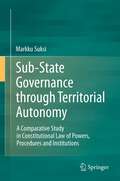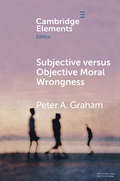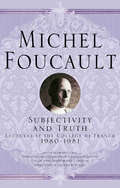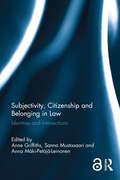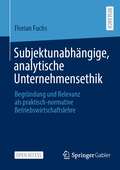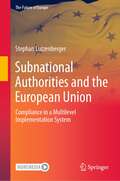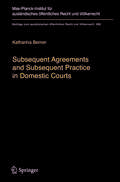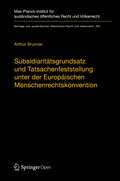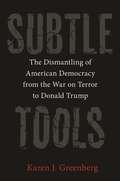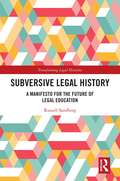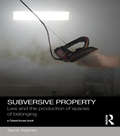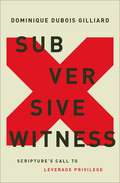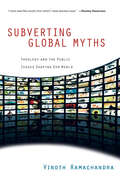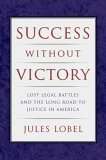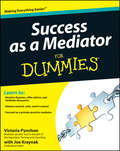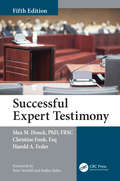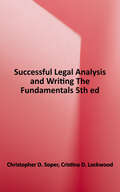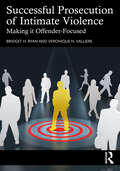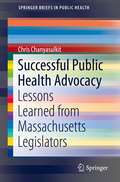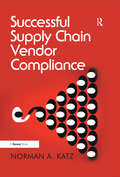- Table View
- List View
Sub-State Governance through Territorial Autonomy
by Markku SuksiThis study focuses on territorial autonomy, which is often used in different conflict-resolution and minority situations. Four typical elements are identified on the basis of the historical example of the Memel Territory and the so-called Memel case of the PCIJ; distribution of powers, participation through elections and referendums, executive power of territorial autonomy, and international relations. These elements are used for a comparative analysis of the constitutional law that regulates the position of six currently existing special jurisdictions, the Åland Islands in Finalnd, Scotland in the United Kingdom, Puerto Rico in the United States of America, Hong Kong in China, Aceh in Indonesia and Zanzibar in Tanzania. The current sub-state entities examined can be arranged in relation to Memel in a manner that indicates that Hong Kong and the Åland conform to the typical territorial autonomy, while Puerto Rico and Aceh should probably not be understood as territorial autonomies proper. At the same time, the territorial autonomies can be distinguished from federally organized sub-state entities.
Subjective versus Objective Moral Wrongness (Elements in Ethics)
by Peter A. GrahamThere is presently a debate between Subjectivists and Objectivists about moral wrongness. Subjectivism is the view that the moral status of our actions, whether they are morally wrong or not, is grounded in our subjective circumstances – either our beliefs about, or our evidence concerning, the world around us. Objectivism, on the other hand, is the view that the moral status of our actions is grounded in our objective circumstances – all those facts other than those which comprise our subjective circumstances. A third view, Ecumenism, has it that the moral status of our actions is grounded both in our subjective and our objective circumstances. After outlining and evaluating the various arguments both against Subjectivism and against Objectivism, this Element offers a tentative defense of Objectivism about moral wrongness.
Subjectivity and Truth: Lectures at the Collège de France, 1980-1981
by Michel Foucault“The working hypothesis is this: it is true that sexuality as experience is obviously not independent of codes and systems of prohibitions, but it needs to be recalled straightaway that these codes are astonishingly stable, continuous, and slow to change. It needs to be recalled also that the way in which they are observed or transgressed also seems to be very stable and very repetitive. On the other hand, the point of historical mobility, what no doubt change most often, what are most fragile, are modalities of experience.” - Michel Foucault In 1981 Foucault delivered a course of lectures which marked a decisive reorientation in his thought and of the project of a History of Sexuality outlined in 1976. It was in these lectures that arts of living became the focal point around which he developed a new way of thinking about subjectivity. It was also the moment when Foucault problematized a conception of ethics understood as the patient elaboration of a relationship of self to self. It was the study of the sexual experience of the Ancients that made these new conceptual developments possible. Within this framework, Foucault examined medical writings, tracts on marriage, the philosophy of love, or the prognostic value of erotic dreams, for evidence of a structuration of the subject in his relationship to pleasures (aphrodisia) which is prior to the modern construction of a science of sexuality as well as to the Christian fearful obsession with the flesh. What was actually at stake was establishing that the imposition of a scrupulous and interminable hermeneutics of desire was the invention of Christianity. But to do this it was necessary to establish the irreducible specificity of ancient techniques of self. In these lectures, which clearly foreshadow The Use of Pleasures and The Care of Self, Foucault examines the Greek subordination of gender differences to the primacy of an opposition between active and passive, as well as the development by Imperial stoicism of a model of the conjugal bond which advocates unwavering fidelity and shared feelings and which leads to the disqualification of homosexuality.
Subjectivity, Citizenship and Belonging in Law: Identities and Intersections
by Anne Griffiths Sanna Mustasaari Anna Mäki-Petajä-LeinonenThis collection of articles critically examines legal subjectivity and ideas of citizenship inherent in legal thought. The chapters offer a novel perspective on current debates in this area by exploring the connections between public and political issues as they intersect with more intimate sets of relations and private identities. Covering issues as diverse as autonomy, vulnerability and care, family and work, immigration control, the institution of speech, and the electorate and the right to vote, they provide a broader canvas upon which to comprehend more complex notions of citizenship, personhood, identity and belonging in law, in their various ramifications.
Subjectivity, Citizenship and Belonging in Law: Identities and Intersections
by Anne Griffiths Sanna Mustasaari Anna Mäki-Petäjä-LeinonenThis collection of articles critically examines legal subjectivity and ideas of citizenship inherent in legal thought. The chapters offer a novel perspective on current debates in this area by exploring the connections between public and political issues as they intersect with more intimate sets of relations and private identities. Covering issues as diverse as autonomy, vulnerability and care, family and work, immigration control, the institution of speech, and the electorate and the right to vote, they provide a broader canvas upon which to comprehend more complex notions of citizenship, personhood, identity and belonging in law, in their various ramifications.Chapter 7 of this book is freely available as a downloadable Open Access PDF at http://www.taylorfrancis.com under a Creative Commons Attribution-Non Commercial-No Derivatives (CC-BY-NC-ND) 4.0 license.
Subjektunabhängige, analytische Unternehmensethik: Begründung und Relevanz als praktisch-normative Betriebswirtschaftslehre
by Florian FuchsIn diesem Open-Access-Buch beleuchtet Florian Fuchs den historischen Diskurs um eine Integration ethischer Fragestellungen in die betriebswirtschaftliche Forschung. Vor dem Hintergrund einer bisher fehlenden originären Mesoethik entwickelt er mit einem Rekurs auf die Erkenntnisse der neueren Systemtheorie eine neue Unternehmensethikkonzeption. Diese ermöglicht erstmalig die Konzeption einer genuinen Unternehmensethik als strukturiertes Legitimitätsmanagement. Seit der Begründung der Betriebswirtschaftslehre Ende des 19. Jahrhunderts wird um die Sinnhaftigkeit und Möglichkeit einer fundierten Beschäftigung mit normativen Aussagen im Allgemeinen, sowie einer Forschungstätigkeit in der Domäne der Wirtschaftsethik im Speziellen, intensiv wie kontrovers gerungen. Dabei bleibt vor dem Hintergrund zahlreicher Unternehmensskandale und einer zunehmenden gesellschaftlichen Kritik an der Wirtschaftspraxis eine kritische Reflexion wirtschaftlichen Handelns hochrelevant – wobei allerdings die Frage zu stellen ist, wie eine wirtschaftsethische Beschäftigung für die BWL wissenschaftshistorisch informiert wie auch wissenschaftstheoretisch fundiert zu begründen wäre.
Submarine Cables Protection and Regulations: A Comparative Analysis and Model Framework
by Utpal Kumar Raha Raju K. D.This book highlights the critical importance of laying, quick relinking, and protecting submarine cables with timely approval for carriers and cable repairing ships and how these are most challenging in many jurisdictions. It identifies that a dedicated national instrument on submarine cable as a way forward is yet to be appreciated by many States, and presently, there is no model legal framework for national instruments on submarine cables available. To bridge these gaps, the book undertakes a systematic inquiry and analysis of submarine cable regimes' and relevant authorities. It consults existing knowledge on international law on cables and analyzes specific principles and provisions on laying repair and maintenance of submarine cables and states’ obligations towards protecting cables from vulnerabilities. It touches upon cable regulation in the deep sea concerning the International Seabed Authority and proposed biodiversity agreement. It indicates suitable measures on cable laying, etc., and security risks in the marine space beyond the national jurisdictions. To map States’ response, it explores the domestic cable regimes, including both the selected jurisdictions and Australia and New Zealand, analyses specific legal provisions and institutional set-up, and demonstrates state practices, approaches, and loopholes in the governance of the cable system within national jurisdictions. The book suggests adopting the spatial ocean management approach, dedicated regulatory authority, a competent enforcement agency, strict liability with exemplary punishment on cable damage, and the cable system to strengthen the cable system's management. Finally, it arranges the fundamental premises of a common minimum framework for national instruments seeking coastal states’ deliberations in implementing initiatives towards a robust law and policy for reliability, resiliency, and security of the cable system. The cable industries, pipeline, fishing, shipping industries, academicians, government authorities, international bodies, and the maritime community worldwide are looking at the issues and challenges of submarine cable regimes, particularly national regimes and suggestive remedial measures. These stakeholders will find the book a useful reference.
Subnational Authorities and the European Union: Compliance in a Multilevel Implementation System (The Future of Europe)
by Stephan LutzenbergerThe European Union, as a regulatory polity based on integration through law, arguably relies more on legal compliance with its policies than any other political system. Proceeding from this point of departure, this book puts the spotlight on the subnational tier and scrutinizes its role in ensuring compliance. Drawing on a dataset of infringement proceedings against federal and regionalized member states, the book shows that strong shared rule, i.e., strong cooperation between national and subnational authorities, can improve national compliance records. In contrast, policy sectors with strong redistributive consequences impair subnational authorities’ capacity to comply. In short, policy and politics matter more than polity.
Subsequent Agreements and Subsequent Practice in Domestic Courts
by Katharina BernerThe book analyses how subsequent agreements and subsequent practice as defined in articles 31 and 32 of the 1969 Vienna Convention on the Law of Treaties have been applied in interpretative reality. Based on the jurisprudence of domestic courts, it elucidates the distribution of power between the parties to a treaty and other actors. To start with, the book traces the origins of subsequent agreements and subsequent practice and places them in their broader legal context. Next, it explores the legal status and effects of subsequent agreements and subsequent practice, explains why such agreements are only rarely used, and defines the relevance of non-party practice in the interpretative process. In closing, it critically examines how domestic courts have approached the normative heart of subsequent practice, i. e. the notion of 'agreement'. Thus, this book ultimately challenges the traditional assumption that the parties are the joint masters of the treaty.
Subsidiaritätsgrundsatz und Tatsachenfeststellung unter der Europäischen Menschenrechtskonvention: Analyse der Rechtsprechung zu Art. 3 EMRK (Beiträge zum ausländischen öffentlichen Recht und Völkerrecht #283)
by Arthur BrunnerDieses Buch ist eine Open-Access-Publikation unter einer CC BY 4.0 Lizenz. Subsidiarität ist zu einem Schlüsselbegriff des Diskurses um die Europäische Menschenrechtskonvention (EMRK) geworden. Neben seiner vielbeachteten materiell-rechtlichen Funktion kommt dem Begriff auch eine verfahrensrechtliche Tragweite zu. Das vorliegende Buch widmet sich dieser prozessualen Dimension des Subsidiaritätsprinzips und beleuchtet das Verhältnis von nationalen Gerichten und Europäischem Gerichtshof für Menschenrechte (EGMR) mit Blick auf die Tatsachenfeststellung. Konkret geht es einerseits um die Frage, wie der EGMR mit Tatsachen umgehen soll, die erst nach Abschluss des nationalen Verfahrens entstanden sind oder vor dem EGMR neu vorgebracht werden (echte und unechte Noven). Anderseits ist aufzuzeigen, ob und unter welchen Umständen der EGMR von den Tatsachenfeststellungen der nationalen Gerichte abweichen darf.
Substantive Protection under Investment Treaties
by Jonathan BonnitchaSubstantive Protection under Investment Treaties provides the first systematic analysis of the consequences of the substantive protections that investment treaties provide to foreign investors. It proposes a new framework for identifying and evaluating the costs and benefits of differing levels of investment treaty protection, and uses this framework to evaluate the levels of protection for foreign investors implied by different interpretations of the fair and equitable treatment and indirect expropriation provisions of investment treaties. The author examines the arguments and assumptions of both supporters and critics of investment treaties, seeks to test whether they are coherent and borne out by evidence, and concludes that the 'economic' justifications for investment treaty protections are much weaker than is generally assumed. As such, the 'economic' objectives of investment treaties are not necessarily in tension with other 'non-economic' objectives. These findings have important implications for the drafting and interpretation of investment treaties.
Subtle Tools: The Dismantling of American Democracy from the War on Terror to Donald Trump
by Karen J. GreenbergHow policies forged after September 11 were weaponized under Trump and turned on American democracy itselfIn the wake of the September 11 terror attacks, the American government implemented a wave of overt policies to fight the nation’s enemies. Unseen and undetected by the public, however, another set of tools were brought to bear on the domestic front. In this riveting book, one of today’s leading experts on the US security state shows how these “subtle tools” imperiled the very foundations of democracy, from the separation of powers and transparency in government to adherence to the Constitution.Taking readers from Ground Zero to the Capitol insurrection, Karen Greenberg describes the subtle tools that were forged under George W. Bush in the name of security: imprecise language, bureaucratic confusion, secrecy, and the bypassing of procedural and legal norms. While the power and legacy of these tools lasted into the Obama years, reliance on them increased exponentially in the Trump era, both in the fight against terrorism abroad and in battles closer to home. Greenberg discusses how the Trump administration weaponized these tools to separate families at the border, suppress Black Lives Matter protests, and attempt to overturn the 2020 presidential election.Revealing the deeper consequences of the war on terror, Subtle Tools paints a troubling portrait of an increasingly undemocratic America where disinformation, xenophobia, and disdain for the law became the new norm, and where the subtle tools of national security threatened democracy itself.
Suburban Sweatshops: The Fight for Immigrant Rights
by Jennifer GordonJorge Bonilla is hospitalized with pneumonia from sleeping at the restaurant where he works, unable to afford rent on wages of thirty cents an hour. Domestic worker Yanira Juarez discovers she has labored for six months with no wages at all; her employer lied about establishing a savings account for her. We live in an era of the sweatshop reborn. In 1992 Jennifer Gordon founded the Workplace Project to help immigrant workers in the underground suburban economy of Long Island, New York. In a story of gritty determination and surprising hope, she weaves together Latino immigrant life and legal activism to tell the unexpected tale of how the most vulnerable workers in society came together to demand fair wages, safe working conditions, and respect from employers. Immigrant workers--many undocumented--won a series of remarkable victories, including a raise of thirty percent for day laborers and a domestic workers' bill of rights. In the process, they transformed themselves into effective political participants. Gordon neither ignores the obstacles faced by such grassroots organizations nor underestimates their very real potential for fundamental change. This revelatory work challenges widely held beliefs about the powerlessness of immigrant workers, what a union should be, and what constitutes effective lawyering. It opens up exciting new possibilities for labor organizing, community building, participatory democracy, legal strategies, and social justice.
Subversive Legal History: A Manifesto for the Future of Legal Education (Transforming Legal Histories)
by Russell SandbergProvocative, audacious and challenging, this book rejuvenates not only the historical study of law and but also the role of Law Schools by asking which stories we tell and which stories we forget. It argues that a historical approach to law should be at the beating heart of the Law School curriculum. Far from being archaic, elitist and dull, historical perspectives on law are and should be subversive. Comparison with the past underscores: how the law and legal institutions are not fixed but are constructed; that every line drawn in the law and everything the law holds as sacred is arbitrary; and how the environment into which law students are socialised is a historical construct. A subversive approach is needed to highlight, question, de-construct and re-construct the authored nature of the law, revealing that that legal change on a larger scale is possible. Subversive Legal History is not a type of Legal History but is a characteristic. It describes a legal method that should not be the preserve only of specialist legal historians but rather should be part of the toolkit of all law students, teachers and researchers. The book will be essential reading for all who work and study in Law Schools, proposing a radical new approach not only to the historical study of law but to the content, purpose and ambition of legal education. A subversive approach can revolutionise Law Schools providing a more ambitious legal education which is grounded in the socio-legal reality, helping to ensure that today’s law students are better equipped to be the professionals and citizens of tomorrow.
Subversive Property: Law and the Production of Spaces of Belonging (Social Justice)
by Sarah KeenanThis book explores the relationship between space, subjectivity and property in order to invert conventional socio-legal understandings of property. Sarah Keenan demonstrates that new political possibilities for property may be unveiled by thinking about property in terms of space and belonging, rather than exclusion. Drawing on feminist and critical race theory, this book shifts focus away from the propertied subject and on to the broader spaces in and through which the propertied subject is located. Using case studies, such as analyses of compulsory leases under Australia’s Northern Territory Intervention and lesbian asylum cases from a range of jurisdictions, Keenan argues that these spaces consist of networks of relations that revolve around belonging: not just belonging between subject and object, as property is traditionally understood, but also the less explored relation of belonging between the part and the whole. This book therefore offers a conceptually useful way of analysing a wide range of socio-legal issues. It will be of relevance to those working in the area of property and legal geography, but also to those with more general interests in socio-legal studies, social and political theory, postcolonial studies, critical race studies and gender and sexuality studies.
Subversive Witness: Scripture's Call to Leverage Privilege
by Dominique DuBois GilliardLearn to leverage privilege.Privilege is a social consequence of our unwillingness to reckon with and turn from sin. But properly stewarded, it can help us see and participate in God's inbreaking kingdom. Scripture repeatedly affirms that privilege is real and declares that, rather than exploiting it for selfish gain or feeling immobilized by it, Christians have a responsibility to leverage it.Subversive Witness asks us to grapple with privilege, indifference, and systemic sin in new ways by using biblical examples to reveal the complex nature of privilege and Christians' responsibility in stewarding it well.Dominique DuBois Gilliard highlights several people in the Bible who understood this kingdom call. Through their stories, you will discover how to leverage privilege to:Resist SinStand in Solidarity with the OppressedBirth LiberationCreate Systemic ChangeProclaim the Good NewsGenerate Social TransformationBy embodying Scripture's subversive call to leverage--and at times forsake--privilege, readers will learn to love their neighbors sacrificially, enact systemic change, and grow more Christlike as citizens of God's kingdom.
Subverting Global Myths: Theology and the Public Issues Shaping Our World
by Vinoth RamachandraSubverting Global Myths
Success Stories: Remarkable Kids; Right Under Your Nose
by Lilly Golden Ann Martin BowlerNIMAC-sourced textbook
Success Without Victory: Lost Legal Battles and the Long Road to Justice in America (Critical America #70)
by Jules LobelWinners and losers. Success and failure. Victory and defeat. American culture places an extremely high premium on success, and firmly equates it with winning. In politics, sports, business, and the courtroom, we have a passion to win and are terrified of losing.Instead of viewing success and failure through such a rigid lens, Jules Lobel suggests that we move past the winner-take-all model and learn valuable lessons from legal and political activists who have advocated causes destined to lose in court but have had important, progressive long term effects on American society. He leads us through dramatic battles in American legal history, describing attempts by abolitionist lawyers to free fugitive slaves through the courts, Susan B. Anthony's trial for voting illegally, the post-Civil War challenges to segregation that resulted in the courts’ affirmation of the separate but equal doctrine in Plessy v. Ferguson, and Lobel’s own challenges to United States foreign policy during the 1980s and 1990s. Success Without Victory explores the political, social, and psychological contexts behind the cases themselves, as well as the eras from which they originated and the eras they subsequently influenced.
Success as a Mediator For Dummies
by Joe Kraynak Victoria PynchonEverything you need to enter the exciting field of legal mediation To be an effective mediator, it's essential to possess the ability to take control of animated situations, offer advice, and facilitate discussion--all the while remaining neutral without formulating biased judgment. Success as a Mediator For Dummies helps you acquire these attributes and much more. Aspiring mediators will learn the importance of upholding an honorable reputation, the skills, personality traits, and characteristics of a good mediator, and how to effectively market a successful mediation career. Plus, you'll get practical advice about finding work in the field, realistic salary information, and tips on as tips on identifying whether you have the skills and tools to become a good mediator. The steps necessary to become a mediator (education, training, licensing, states-specific requirements, etc. ) How your education and professional background can enhance your mediation work Sample rules and standards of conduct All the steps necessary to build and market a successful private practice in mediation, or flourish as a mediator in a law firm, corporation, school, or non-profit organization Whether you have a background in law or an interest in legal careers, Success as a Mediator For Dummies gives you everything you need to enter the exciting field of legal mediation.
Successful Expert Testimony
by Max M. Houck Christine Funk Harold FederA major revision of the landmark book on expert testimony Feder’s Succeeding as an Expert Witness, Successful Expert Testimony, Fifth Edition highlights the book’s value to both attorneys and expert witnesses in promoting effective, impactful courtroom testimony. The book outlines the role of expert testimony in a trial, including explanations of methods, testing, and science, the legal process, and an overview of the roles of each player. Succeeding as an expert witness requires a basic understanding of who and what experts are and what role they play in rendering their opinions within the courts. The new edition has been fully updated to present key information on the most vital topics, including the deposition, a discussion of false or unsupported testimony, adherence to scientific principles, and direct and cross-examination testimony of expert witnesses. Each chapter includes key terms, review questions, and thought-provoking discussion questions for further consideration of the topics addressed. Given many high profile cases and increasing incidents of misconduct, this edition focuses heavily on the role of ethics in expert testimony and forensic practice. The full revised chapter on ethics, covers unethical conduct of forensic witnesses, admissibility of expert testimony, inter-professional relations, abuse of and by experts, and forensic professional codes of ethics. Offering useful career insights and established trial-tested tips, forensic scientist Max M. Houck and attorney Christine Funk update renowned lawyer Harold A. Feder’s classic book. Successful Expert Testimony, Fifth Edition serves as an ideal reference for forensic science students entering the work force—in labs and investigative positions—in addition to serving as a crucial resource for more experienced civil, private, and testifying experts in all disciplines.
Successful Legal Analysis and Writing: The Fundamentals
by Christopher D. Soper Cristina D. LockwoodThis work is a practical legal analysis and writing handbook. Designed for first-year students, it is also a valuable refresher text for more advanced students, and practitioners. This easy-to-read book features fundamental advice on how to communicate written and oral legal analysis from a problem-solving perspective. It features illustrative examples and templates. The fifth edition includes additional examples and models, and appendices with practice exercises and sample answers, all created in collaboration between one author with recent practice experience and one who has been teaching for over twenty years. It also incorporates professional ethical and technological considerations throughout, while providing learning objectives for each chapter.
Successful Prosecution of Intimate Violence: Making it Offender-Focused
by Veronique N. Valliere Bridget H. RyanOffender-focused prosecution concentrates attention to the actions, decisions, choices, and motivations of the offender. Crimes of intimate violence tend to compel investigators, prosecutors, and defense attorneys to fixate on the victim’s behavior to prove or disprove a case. Prosecutors can become helpless when faced with uncooperative victims, challenging facts, or attacks on the victims’ credibility. However, when the prosecution can rely on evidence and offender-focused interviewing, investigation, and case construction, there is a greater chance of success. This book will offer investigators and prosecutors concrete information and techniques to construct and present offender-focused cases in crimes of intimate violence. First, we will challenge the reader’s biases and assumptions about intimate violence, providing information that will dispel pervasive myths and misinformation we maintain. We will explain the motivations and techniques that offenders use on their victims to ensure the victims’ silence, compliance, and resistance to prosecution. The second section will address specific steps that investigators and prosecutors can take for offender-focused prosecution, including interviewing practices, conducting evidence-based investigations, selecting and preparing a jury, and building an offender-focused prosecution through the case. The reader will be offered practical and attainable practices and skills. This book will be primarily intended for investigators or prosecutors. However, it will be accessible to paralegals, victim advocates, judges, and others involved in the criminal justice system to utilize.
Successful Public Health Advocacy: Lessons Learned from Massachusetts Legislators (SpringerBriefs in Public Health)
by Chris ChanyasulkitThis concise volume guides public health advocates on how to successfully advocate for their cause, strengthen their messaging and communication strategies, build coalitions, and gather political allies.In the book, the author shares lessons learned from an exploratory study in which key legislators from the Massachusetts General Court (legislature) were interviewed to determine their level of awareness and knowledge regarding health disparities. Racial and ethnic disparities in health are a major concern for citizens, states, and the nation and are important to study and understand to strategically address and eliminate such inequities. Through these lessons, public health advocates gain an understanding of whether and how factors affect knowledge and awareness of health disparities and learn to communicate more effectively with legislators, key stakeholders, and other decision-makers. The brief also features “Notes from the Field" from those working in the "trenches" that highlight different perspectives on health disparities and provide first-hand advice for advocates hoping to close the disparities gaps and create a more equitable nation for all. Successful Public Health Advocacy is a relevant resource for advocates, as well as students, in public health, public policy, and related fields who wish to gain a better understanding on how legislators gather their health information for policy-making or constituent work and apply this data to develop and implement effective public health advocacy campaigns.
Successful Supply Chain Vendor Compliance
by Norman A. KatzNorman Katz has secured a top spot as one of the Top 50 Global Thought Leaders and Influencers on Supply Chain 2020. Even the largest companies find managing vendors a daunting task. If you get it wrong then you risk inadvertently penalizing potentially valuable suppliers with misguided, overly bureaucratic or costly processes. Worse the burdens placed on the vendors backfires on the customer entity itself as the customer is subjected to the increased operational costs of managing the ramifications of the ill-conceived or poorly implemented requirement through the vendor community, driving up its own operational costs and increasing frustrations for all, straining the customer-vendor relationship. Effective compliance programs balance the requirements with the capabilities of their suppliers, striving to educate instead of just inform. A well-run program should help vendors self-implement and control costs, not force vendors to rely on constant communication and increase costs for all trading partners involved. Successful Supply Chain Vendor Compliance explains the technical, process and cultural elements that go into a successful compliance program. Norman Katz exposes the weaknesses in traditional programs and identifies the characteristics of well-managed programs that foster beneficial trading partner relationships. He shows how a well-executed vendor compliance program can control and decrease costs by reducing disruptions throughout the supply chain, from the distribution center to the data center to the corporate office. Competition is fierce, and the right vendor can help you define a business model, react quickly to changes, and differentiate between you and your competitors. See the latest Forbes article on Abusive Compliance Practices!
